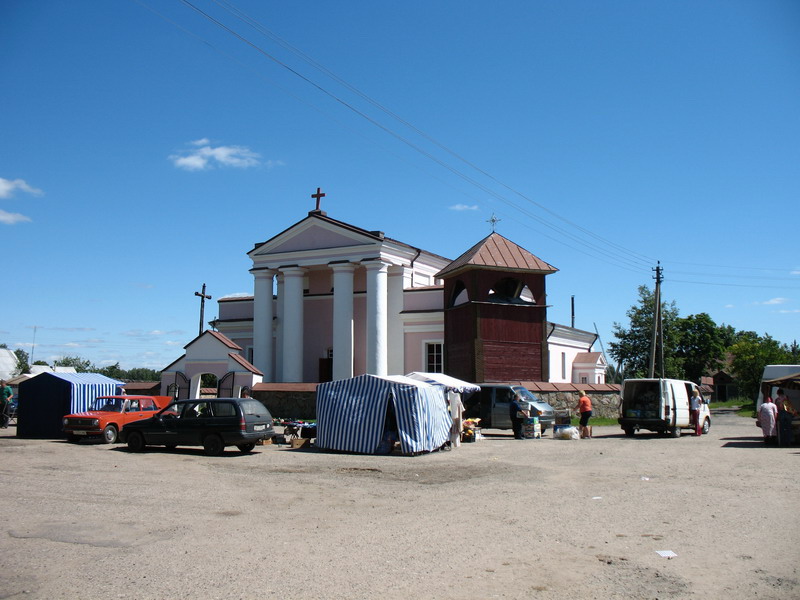|
Daŭhinava
Daŭhinava ( be, Даўгінава; russian: Долгиново ''Dolginovo''; pl, Dołhinów; yi, דאלהינאוו) is a village in the Vileyka District, Minsk Region, Belarus. It is located north of Minsk and east-northeast of Vilejka. Between the two World Wars it was part of the Wilno Voivodeship (1926–39), Wilno Voivodeship of Second Polish Republic, Poland. Jewish life in Daŭhinava There were 1,194 Jews in Daŭhinava in 1847, 2,559 in 1897 out of a total population of 3,551 (based on statistical analysis of the 1897 All Russia Census, for the Vileyka district town of Dolginovo), 2,259 in 1900 and 1,747 in 1921 (out of 2,671). See th Dolhinow yizkor bookfor additional information. Rabbi Yaakov Yitzchok Ruderman was born in Daŭhinava, and his cousin Rabbi Yaakov Kamenetsky grew up in the town. External referencesDolhinov Yizkor Book [...More Info...] [...Related Items...] OR: [Wikipedia] [Google] [Baidu] |
Yaakov Yitzchok Ruderman
Yaakov Yitzchok Ruderman (Shushan Purim 1900, Daŭhinava - July 11, 1987) was a prominent Talmudic scholar and rabbi who founded and served as '' rosh yeshiva'' (yeshiva head) of Yeshivas Ner Yisroel in Baltimore. Early life Ruderman was born to a Hasidic family of the Chabad denomination in Daŭhinava, in the Vilna Governorate of the Russian Empire (present-day Belarus), where his father, Rabbi Yehuda Leib Ruderman, was the rabbi. He studied in Yeshivas Knesses Yisrael in Slabodke, under the "Alter", Rabbi Nosson Tzvi Finkel, and the ''rosh yeshiva'', Rabbi Moshe Mordechai Epstein, receiving ''semicha'' from the latter in 1926. Career In 1924, two years before receiving semikhah (ordination), Ruderman married Faiga Kramer from a rabbinical family. In 1930, he joined his father-in-law, Rabbi Sheftel Kramer, at the latter's yeshiva in New Haven, Connecticut. In 1931, the Ruderman family moved to Cleveland, Ohio, where he served as one of the teachers at the Telshe Yeshiva. ... [...More Info...] [...Related Items...] OR: [Wikipedia] [Google] [Baidu] |
Yaakov Kamenetsky
Yaakov Kamenetsky (February 28, 1891 – March 10, 1986), was a prominent rabbi, rosh yeshiva, ''posek'' and Talmudist in the post-World War II American Jewish community. Biography Yaakov Kamenetsky was born at a folwark called Kalyskovka owned by his grandfather Samuel-Hirsh Kamenetsky, Russia, in 1891. Shortly afterwards his family moved to the village of Dolhinov where he grew up. He studied in Minsk and then for 21 years in Slabodka yeshiva under Rabbi Nosson Tzvi Finkel. It was there that he met his lifelong friend Rabbi Aharon Kotler, who later founded the Lakewood yeshiva. His younger cousin, Rabbi Yaakov Yitzchak Ruderman, also grew up in Dolhinov. Kamenetsky was appointed rabbi of Tzitavyan in 1926 and moved to North America in 1937, where he initially took rabbinical positions in Seattle and then (from 1938-1945) Toronto. From 1948 to 1968 he headed Mesivta Torah Vodaath in Brooklyn, New York. After leaving the yeshiva he moved to Monsey, New York, where he focused on ... [...More Info...] [...Related Items...] OR: [Wikipedia] [Google] [Baidu] |
Catholic Church In Daŭhinaŭ, Biełaruś
The Catholic Church, also known as the Roman Catholic Church, is the largest Christian church, with 1.3 billion baptized Catholics worldwide . It is among the world's oldest and largest international institutions, and has played a prominent role in the history and development of Western civilization. O'Collins, p. v (preface). The church consists of 24 ''sui iuris'' churches, including the Latin Church and 23 Eastern Catholic Churches, which comprise almost 3,500 dioceses and eparchies located around the world. The pope, who is the bishop of Rome, is the chief pastor of the church. The bishopric of Rome, known as the Holy See, is the central governing authority of the church. The administrative body of the Holy See, the Roman Curia, has its principal offices in Vatican City, a small enclave of the Italian city of Rome, of which the pope is head of state. The core beliefs of Catholicism are found in the Nicene Creed. The Catholic Church teaches that it is the o ... [...More Info...] [...Related Items...] OR: [Wikipedia] [Google] [Baidu] |

.jpg)